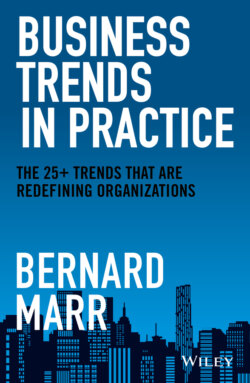Читать книгу Business Trends in Practice - Бернард Марр, Bernard Marr - Страница 12
Trend 3: Growing Divergence and Polarization
ОглавлениеAfter decades of globalization has brought countries closer together, there are signs that countries (and the alliances and systems they participate in) are beginning to decouple. There have been some notable examples of political fragmentation and growing divergence in recent years. We've seen it in the US, when President Trump withdrew from the Paris Agreement on climate mitigation, announced plans to withdraw America from the World Health Organization, and even spoke about withdrawing from NATO. And we've seen it in the UK, with the country leaving the European Union. In the UK, Brexit really emphasized the way large sections of society have shifted toward extreme sides of arguments, with little or no ability to see the other side's perspective. People fell out with friends, neighbors, and family members because of their political opinions, and American voters experienced the same thing during the 2020 election. Groups are becoming more divided along ideological lines, and that goes for groups of voters, and groups within society (think of the often vitriolic debates around feminism or trans rights). A 2019 survey by the Pew Research Center found that partisan division and animosity have deepened since 2016; 63 percent of Republicans said Democrats were “more unpatriotic” than other Americans, and 55 percent said they were more immoral. Meanwhile, 75 percent of Democrats said Republicans were more close-minded than other Americans, and 47 percent said they were more immoral.13
In short, the world feels more polarized than ever. I find this both crazy and disturbing. When did society become so polarized that you're either a staunch Democrat or Republican (or a Brexiter or Remainer, or any other position, political or otherwise), with nothing in between? And when did the other side become immoral and less patriotic? Losing all concept of the other side's perspective is, to me, a danger to our democracy and society. Yet that's exactly what's happening.
When information and analytics company IHS Markit set out its prediction of how the world would look in 2025, it said the “fragmented world” scenario is the most likely. In this scenario, the US, China, the EU, and other key players retreat from globalization and turn their focus inwards to concentrate on domestic challenges.14 It's only a prediction, of course, but the COVID-19 crisis and the resulting economic fallout is likely to exacerbate the desire to turn inwards and focus on domestic problems.
There are a number of reasons why divergence and polarization have grown. There's no global enemy or external threat keeping disparate countries united. And, of course, we can't ignore the impact of social media ghettoes that show people only what they want to see. Thanks to social media algorithms, we simply don't all see the same news. Instead, we're served a stream of content that's personalized to our habits, interests, and beliefs. This is known as the “filter bubble.” Trapped in our bubbles – because this is something we're all susceptible to – we may begin to believe the world is exactly as we see it. Fake news spreads quickly in this environment, because the people in your filter bubble share the same views as you, and it's much easier to believe a fake news story when people you follow are sharing and talking about it. Meanwhile, real problems and issues – and the need to work together to solve society's problems – get lost in the noise.
Technology, then, may play a key role in this growing divergence and polarization. I've already raised the prospect of a technology “Cold War,” and we see hints of this with China restricting companies from exporting technology services, and preventing citizens from accessing certain websites. China is the best-known example of a country with its own isolated internet, and this is something we may see more of in the future. This splintering of the internet even has a name: the “splinternet.” Indeed, Russia has already confirmed that it has created a system that would allow the country to completely decouple from the rest of the world's internet and operate its own independent internet.15
Another factor that may be fueling polarization and divergence is racial and ethnic diversity. While diversity is a long-term benefit for society, in the short term it can trigger social and political conflict and a breakdown in trust. Which brings us to the next subject.
